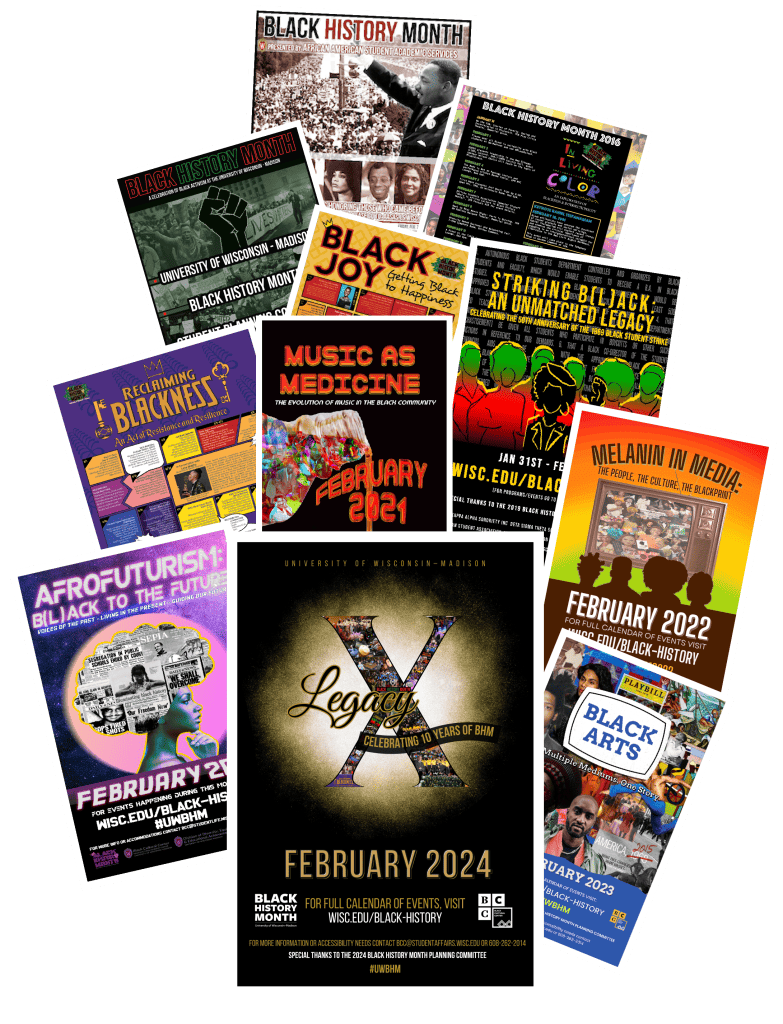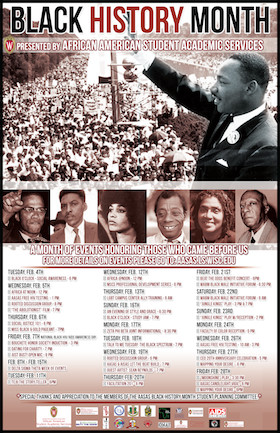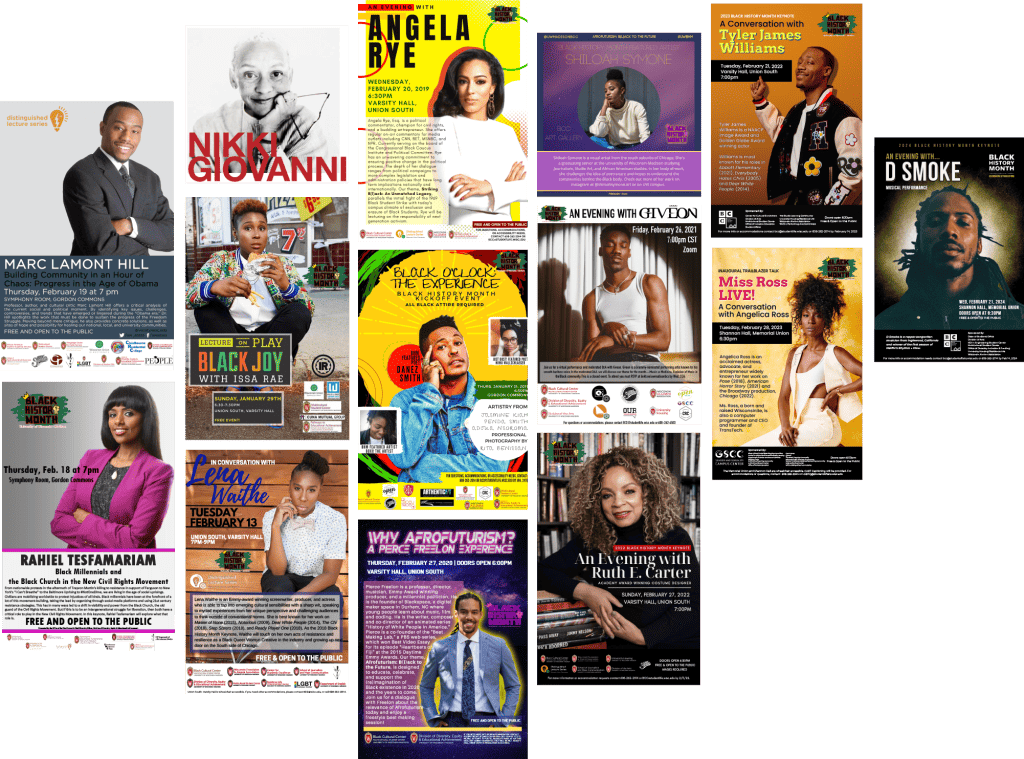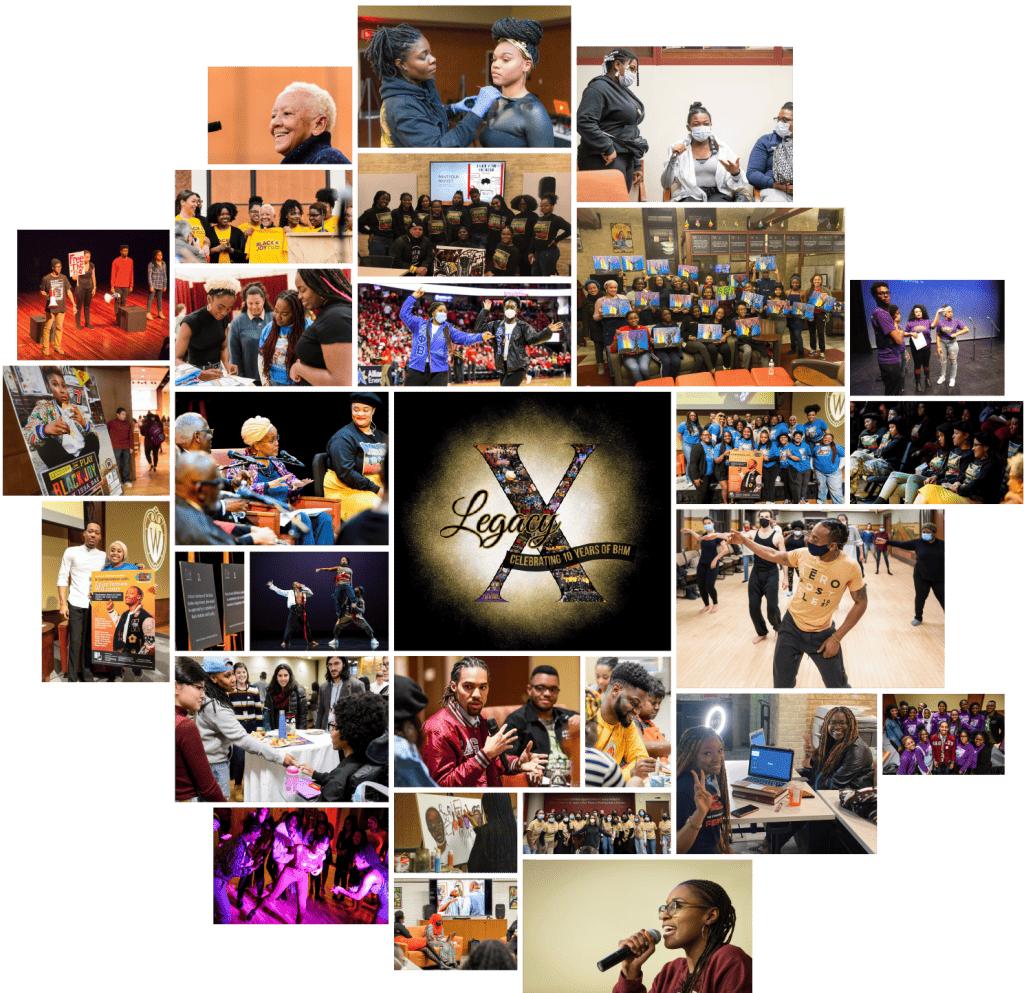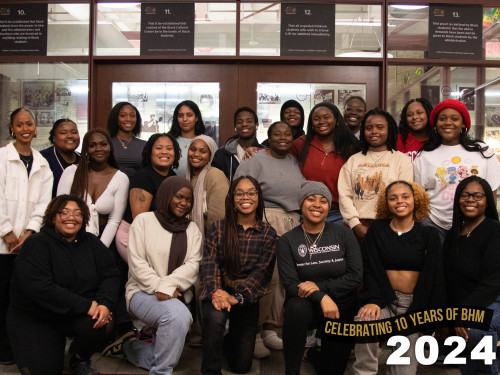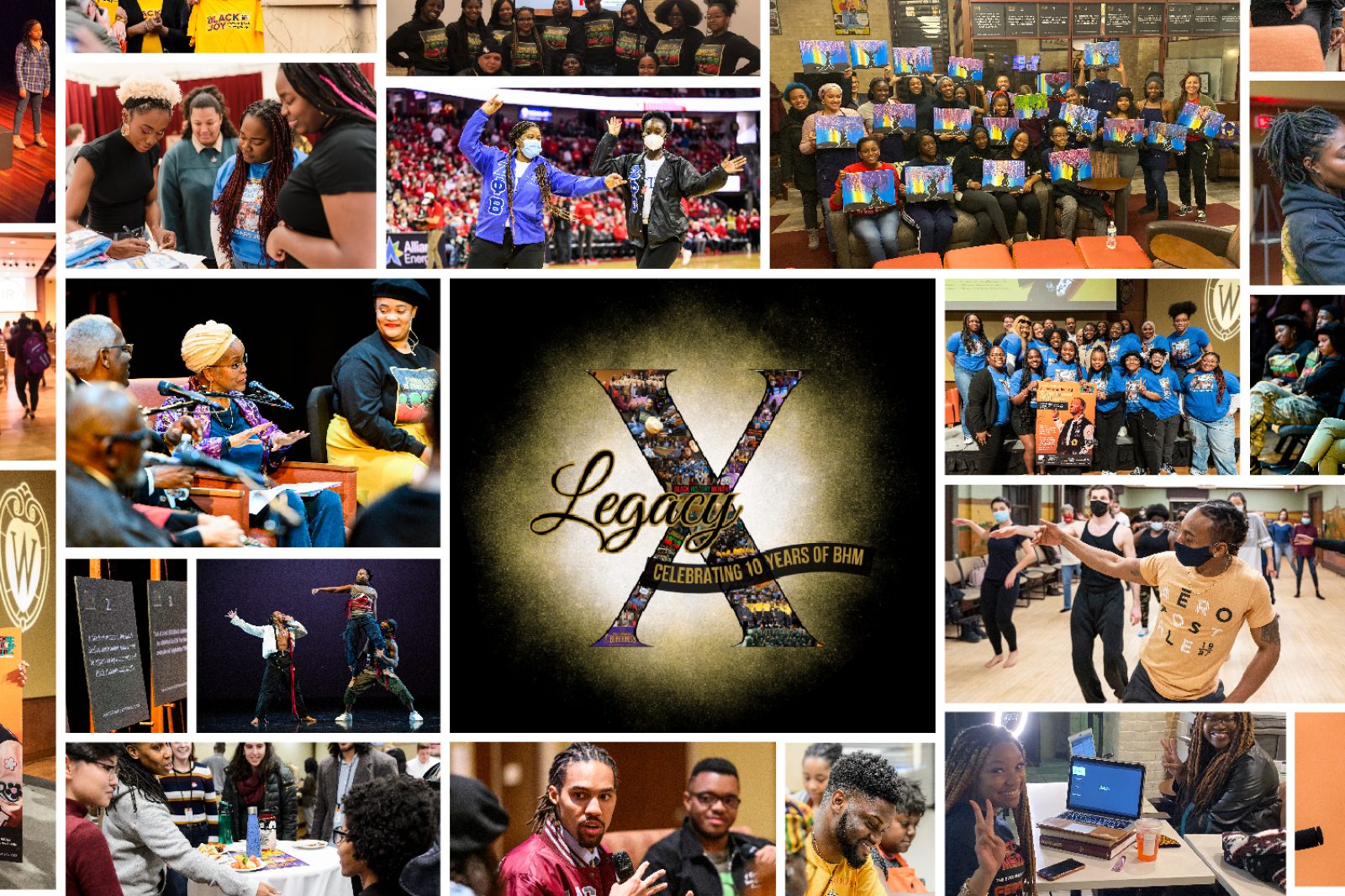
10 years of student-led Black History Month celebrations at UW–Madison
Black History Month has been celebrated each February in the U.S. for many decades — the first official designation is credited to students and educators at Kent State University in 1970. At the University of Wisconsin–Madison, events celebrating Black History Month have also been offered through the years. Building on that legacy, UW’s African American Student Academic Services initiated a student-led Black History Month Planning Committee in 2014 that revitalized and centralized this work, beginning a new era of coordinated, campuswide programming.
Today, the Black History Month Planning Committee is led by students from the Black Cultural Center, which is part of the Multicultural Student Center within Student Affairs. This year’s theme, “Legacy X,” honors the 10th anniversary of campuswide Black History Month programming planned and undertaken by this committee. To mark the milestone, three student journalists interviewed many of the people who helped establish this campuswide tradition. The following oral history captures some of their experiences, memories, joys and challenges.
Getting started
In the fall of 2013, Karla Foster, who was relatively new to campus as a program coordinator and academic advisor for African American Student Academic Services, convened the first meeting of the Black History Month Planning Committee. Student intern Jordan Gaines assisted her and became the chair of the first planning committee.
KARLA FOSTER
Staff advisor for the Black History Month Planning Committee from its start in the fall of 2013 through the 2018 celebration
Jordan and I were in the office one day and I was telling her about my undergraduate experience [at Indiana University–Bloomington] and my graduate school experience [at Indiana State University]. In my master’s program, I was on our campuswide Black History Month Planning Committee. I’m like, “What are y’all doing here for Black History Month?” She said there are pockets of things that are happening but no larger campuswide celebration. So I was like, “Well, let’s do something. Let’s pull it together.”
BRIAN ALLEN
Member of the planning committees for 2014 and 2015
[Karla] brought all these students together from various pockets — the Black Student Union, the UW Gospel Choir, the African Student Association, student activists.
AMANI-BREANNA ALEXANDER
Member of the planning committees for 2014 and 2015
There was something about that time that made us feel really confident in our voices. Actually, this was what it was — it was Karla. She told us, “You all have voices — use them. I will be the person to help facilitate what you all want to do.” She had the resources to help us get things done. She was the liaison.
BRIAN ALLEN
Karla really wanted to put the power in the hands of students. She wanted the events to really reflect our wants and our experiences. She came in really motivated and with this vibrant, inspiring energy that I think really caught fire among the students.
JORDAN GAINES
Chair of planning committees in 2014 and 2015; co-chair of the planning committee in 2016
We had a lot of creativity as a student body, we really did. And we were really working hard to make sure that there were consistent spaces on campus for us and by us. But we didn’t have a lot of support from the actual university, and we didn’t have a lot of money. So I think being able to do it through an academic or a university office made a huge difference.
The first year
The planning committee assembled a roster of events for February 2014, leaning heavily on activities already happening that month but also creating new events specifically for Black History Month.
KARLA FOSTER
That first flyer for February 2014 was literally a combination of all of the events that were happening, whether they were Black History Month-specific or hosted by Black student organizations or hosted by programs and departments that primarily supported Black students on campus. It was just like, let’s pull the calendar together so that it’s all in one place.
JORDAN GAINES
In the beginning, it was a learning curve. I mean, maybe we only had four or five events. We did not have a lot of funding and the events were a little bit bare bones. It was a little raggedy, like, I’ve seen some of the flyers and even our graphic design skills were struggling,
KARLA FOSTER
I believe I did the first flyer, or I tried to. Your girl was very flaky in Photoshop. Moving forward, I’m like, oh, yeah, we need to find a graphic designer because that’s not my ministry.
AMANI-BREANNA ALEXANDER
I remember that first year as being constant conversations about what we wanted this to look like. We wanted to organize the events in a very specific way. We knew we wanted a keynote speaker. We knew we wanted community events and educational events and service opportunities.
BRIAN ALLEN
I remember a lot of discussion-based opportunities, ways that Black students could engage in conversations with one another — topics like mental health and sex education and the diversity and differences within the Black communities.
Building on success
JORDAN GAINES
The support from Black students was pretty immediate. I was a bit surprised at how many people were so down to be a part of that committee.
ALEXIS COLEMAN
Member of the planning committee for 2015; co-chair of the planning committees for 2016 and 2017
It was really important for us in those first couple of years to bridge campus with the greater Madison area because we already are in a bubble on campus. We felt that these are events that people outside can also benefit from and come together in community and there can be fellowship between students and community members and community leaders.
JORDAN GAINES
What elevated the Black History Month program in our second year was that we started to really get buy-in from other campus organizations and campus academic departments and agencies and things like that. They became really invested in this goal and this idea.
ALEXIS COLEMAN
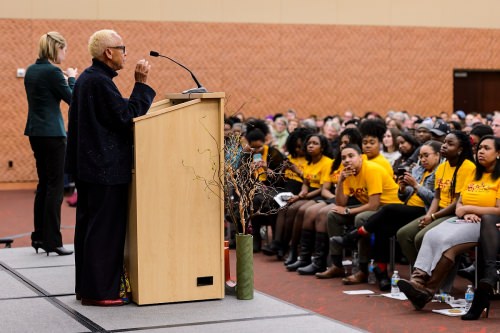
February 2017: Renowned poet Nikki Giovanni gives the Black History Month keynote speech. Photo: Jeff Miller
The keynote speakers were a really big part of our ability to expand. Marc Lamont Hill was our first keynote speaker from outside the university [in 2015], and that kind of set the tone for people thinking, Oh, they’re really doing this. And then later came Issa Rae [the kickoff speaker in 2017] and Nikki Giovanni [the keynote speaker in 2017]. As the keynotes would happen each year, it kind of got people’s attention, not only on campus but in the community.
KARLA FOSTER
We went from eight folks on the first committee to 10, then 16, then to the point where we were capping it. And to see the growth of the budget from $3,500 to being able to bring in famous people like Nikki Giovanni, Lena Waithe, Issa Rae — the leading creators, thought leaders, artists and activists of the times — to see the growth is just phenomenal.
ALEXIS COLEMAN
People began to see that this is valuable for everyone on campus, not just for Black students. Seeing non-Black students show up to events and want to get involved — that was cool.
Memorable moments
NIA SCOTT
An inaugural intern for the Black Cultural Center; co-moderator for a 2018 live event with keynote speaker Lena Waithe
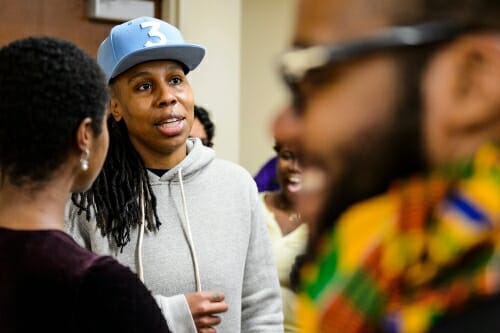
February 2018: Students got a chance to chat with keynote speaker, Emmy-winning writer, actress and producer Lena Waithe. Photo: Jeff Miller
Getting to interview Lena was definitely a dope opportunity. Being a creative person and a masculine-presenting queer woman, I felt like I was able to help cultivate an authentic conversation. It was really nice to be able to share so many identities with her.
JORDAN GAINES
We did an event at the onset of Black Lives Matter. This was before Black Lives Matter is like a phrase you see in a Toyota commercial — it was a phrase that made people really antsy and like, politically upset. And we did an event where we were just talking about the murder of Mike Brown. It was in the Multicultural Student Center, and it was packed.
LAUREN ADAMS
Program coordinator for the Black Cultural Center since 2018; current staff advisor for the planning committee
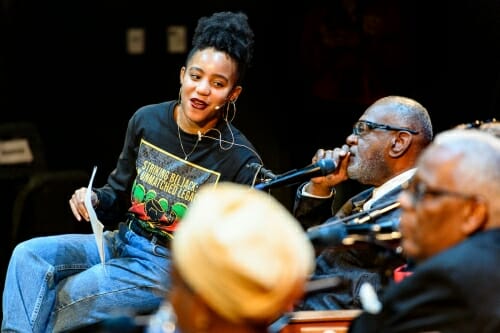
February 2019: Then-junior Shiloah Coley co-moderates a panel discussion with alumni of the 1969 Black Student Strike. Photo: Bryce Richter
2019 was a really special year because it was the 50th anniversary of the Black Student Strike on campus. One of my memories is the panel of participants in the strike. We were able to bring them back and have the conversation of where we were then, and then sort of looking at where we are now. And having those 13 original demands inspire a lot of the students who would come after — the Student Inclusion Coalition, the BIPOC Coalition, the Blk Pwr Coalition — all of them using a lot of the foundational elements of what those students did in 1969 to inform what they’re doing today. I think that was really important.
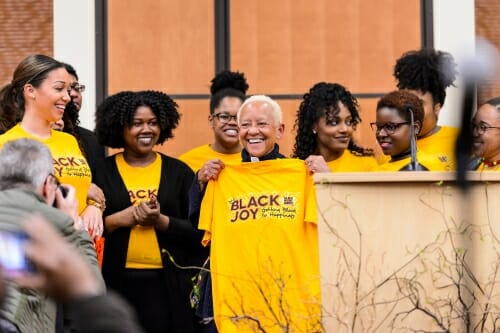
February 2017: The Black History Month planning committee presents Nikki Giovanni with a T-shirt following her talk on “Getting Black to Happiness.” Photo: Jeff Miller
ALEXIS COLEMAN
I really did enjoy Issa Rae, but Nikki Giovanni — we got to kind of spend more time with her outside of the keynote. And she was so cool and fun to be around. So that was really cool. But I think she also gave a great and powerful speech.
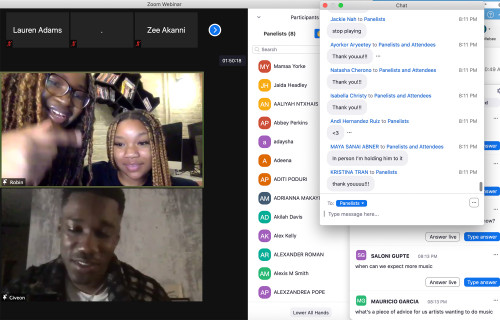
Zee Akanni (top left) and The Black Voice’s Robin Robinson (top right) host the virtual 2021 keynote event with singer Giveon (bottom).
JADA YOUNG
Member of the planning committees in 2022, 2023 and 2024; current co-chair
The keynote speaker my freshman year [Grammy-nominated performing artist Giveon], in February 2021, even though that was like a virtual concert experience [because of COVID-19], you know, I still really enjoyed it, because we were feeling a bit isolated from the community. So just being able to interact with everyone.
Challenges past and present
ALEXIS COLEMAN
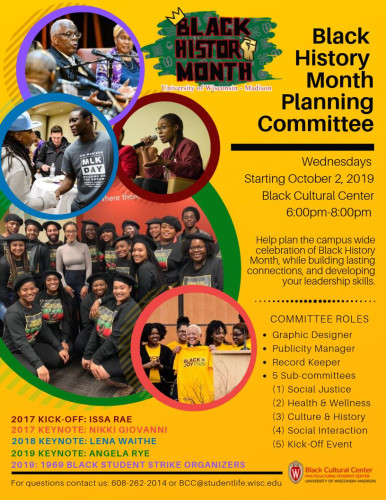
A poster recruiting students to join the planning committee for February 2020’s Black History Month.
Early on, the challenge was kind of just navigating the ins and outs of like, OK, how can we get people excited about this? How can we get people involved in this? How can we make students next year want to join the committee? On the other hand, that was also one of the less challenging parts. Being able to create that blueprint for what it was going to be in the future was really fun.
KENNEDY EGERSON
Member of the planning committees in 2023 and 2024; current co-chair
[I’d like to see] more Black students come out to support the events. But not even just Black students. If more students came to support us, we could prove that this has significance on campus, and I feel like the university would pay more attention to Black History Month.
LAUREN ADAMS
There are some socio-political things going on now that can sometimes call into question whether or not people truly value the work that we do. For me, I just try to center Black students at the core of everything, because it could be easy to get lost in that noise.
LAVAR J. CHARLESTON
Deputy vice chancellor for diversity and inclusion and chief diversity officer
There are significant forces trying to silence a full account of history. So that’s a challenge, and it makes this work vitally important.
The value of Black History Month
BRIAN ALLEN
It was something that students maybe didn’t know they needed, but once they had it, they realized how pivotal it was to their wellness. It can be difficult being a Black student on a predominantly white campus. An event like this kind of lightens the load.
LAUREN ADAMS
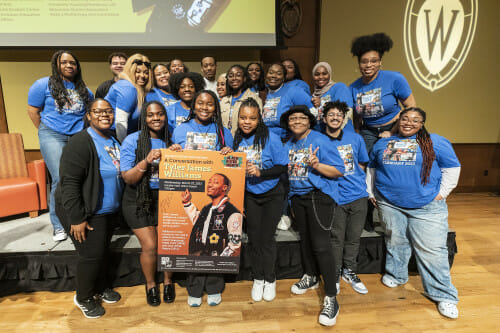
February 2023: Keynote speaker and actor Tyler James Williams poses for a group photo with the Black History Month Planning Committee. Photo: Taylor Wolfram
I’ve seen many students come in, in their first year, and they’re looking for ways to get involved on campus. They see the Black History Month planning committee as the vehicle for them to find their community and find their way. Sometimes they’ll come back the next year and step into the co-chair positions or other leadership positions, and just seeing them evolve and grow in that realm is really fulfilling. And a lot of our co-chairs and a lot of our other students on the committee go on to be student activists in other realms of campus.
JORDAN GAINES
Black History Month is the reason I re-started the Black Voice [an online student newspaper] because we were in the archives, and we were looking at newspapers and looking at Black history on campus and I found the original Black Voice. So it birthed a lot of long-standing spaces on campus for Black students.
LAUREN ADAMS
Something that is very important to note is that the Black History Month Planning Committee set the foundation that is used as a model for other communities, like Latinx Heritage Month and APIDA Heritage Month and MENA Heritage Month. Black students are doing work that is impacting other communities and giving those communities a space to celebrate their identities and their heritages. (Editor’s note: Student Affairs devotes funding and staff to support student-led heritage month celebrations organized through the Multicultural Student Center.)
Reflecting on the 10th anniversary
AMANI-BREANNA ALEXANDER
UW–Madison gave me so much —knowledge, passion, opportunities, some of my best friends. I’m always so grateful for that. So to now look back and think that I played a part in creating something of lasting value while I was there — that’s kind of wild to me. It adds a layer of mutual connectivity. I belonged in that space and left something to show it. I’m really grateful to have played a role in something that is still so meaningful and important to students to this day, and I hope everyone involved knows that they belong as well.”
NIA SCOTT
It’s very important that UW has a Black History Month Student Planning Committee. It’s only been around 10 years. It’s not that old, but it’s so important. And it is kind of drilled into me to want more, because the baseline is acknowledgement and celebration, right?
KARLA FOSTER
The most rewarding part for me personally was to help create and start to establish this space on campus — this acknowledgement of Black excellence on campus. And to see students actually have their own hand in creating and establishing this celebration and being proud of their accomplishments. That’s been so rewarding.
LAVAR J. CHARLESTON
It still matters how much we celebrate this month. There’s always a need to grow more — to grow as a community, as a society. And you can’t learn without diversity, period. Through Black History Month, people can be introduced to a new concept, new constructs, new realities, new truths, and then they can do their own research.
JORDAN GAINES
I hope students are always able to access community and know that their existence and their validity in that space doesn’t hinge on or isn’t dependent on what the university says or what the university decides is lucrative to fund. They have every right to be all facets of themselves.
LAUREN ADAMS
Looking at Black students specifically, what I hope they gain is: There’s a place on campus for me to be proud of who I am, where I don’t have to code switch, where I don’t have to feel like I need to water down parts of my personality or identity. I hope they find the places of belonging and of feeling welcomed and affirmed in their identities.
JADA YOUNG
Black History Month is one of the few times, if not the only time, that Black people get recognized on this campus and appreciated for all that we contribute to the campus community and the broader United States.
KENNEDY EGERSON
If I could say anything to the people on the inaugural Black History Month Planning Committee, I would say thank you. Thank you for bringing that acknowledgment of Black History Month to campus. I can’t imagine the climate that they were in when they were here and creating this committee. So I would just keep it simple and say thank you, because there are no words I could use to explain the significance of their actions.
Voices
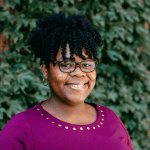 Lauren Adams is the program coordinator for the Black Cultural Center at UW–Madison. A Chicago native, Adams earned a bachelor’s degree in women’s studies with a minor in education policy studies from Loyola University Chicago. She earned a master’s degree in student affairs and a certificate in teaching and learning in post-secondary education from Michigan State University.
Lauren Adams is the program coordinator for the Black Cultural Center at UW–Madison. A Chicago native, Adams earned a bachelor’s degree in women’s studies with a minor in education policy studies from Loyola University Chicago. She earned a master’s degree in student affairs and a certificate in teaching and learning in post-secondary education from Michigan State University.
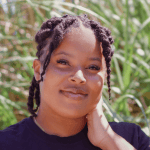 Amani-Breanna Alexander is a marriage and family therapist and student midwife in Los Angeles. Originally from Brooklyn, New York, Alexander earned a bachelor’s degree in rehabilitation psychology and African American studies from UW–Madison in 2016. She was a scholar in the sixth cohort of the First Wave Hip Hop & Urban Arts Scholarship Program. Alexander currently is pursuing a master’s degree in public health through Indiana University–Purdue University Indianapolis.
Amani-Breanna Alexander is a marriage and family therapist and student midwife in Los Angeles. Originally from Brooklyn, New York, Alexander earned a bachelor’s degree in rehabilitation psychology and African American studies from UW–Madison in 2016. She was a scholar in the sixth cohort of the First Wave Hip Hop & Urban Arts Scholarship Program. Alexander currently is pursuing a master’s degree in public health through Indiana University–Purdue University Indianapolis.
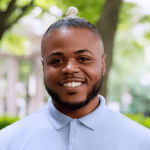 Brian Allen earned a bachelor’s degree from UW–Madison in 2015, double-majoring in English linguistics and Spanish language and culture. Originally from Benton Harbor, Michigan, Allen currently lives in East Harlem, New York, where he is working as an education equity consultant while finishing his dissertation for a doctor of education degree from Teachers College, Columbia University, New York.
Brian Allen earned a bachelor’s degree from UW–Madison in 2015, double-majoring in English linguistics and Spanish language and culture. Originally from Benton Harbor, Michigan, Allen currently lives in East Harlem, New York, where he is working as an education equity consultant while finishing his dissertation for a doctor of education degree from Teachers College, Columbia University, New York.
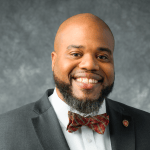 LaVar J. Charleston is deputy vice chancellor for diversity and inclusion, vice provost and chief diversity officer, and the Elzie Higginbottom Director of the Division of Diversity, Equity and Educational Achievement (DDEEA). He is a two-time alumnus of UW–Madison. He earned a master’s degree and a Ph.D. from the Department of Educational Leadership and Policy Analysis in 2007 and 2010, respectively. Charleston is a proud member of Kappa Alpha Psi Fraternity, Inc.
LaVar J. Charleston is deputy vice chancellor for diversity and inclusion, vice provost and chief diversity officer, and the Elzie Higginbottom Director of the Division of Diversity, Equity and Educational Achievement (DDEEA). He is a two-time alumnus of UW–Madison. He earned a master’s degree and a Ph.D. from the Department of Educational Leadership and Policy Analysis in 2007 and 2010, respectively. Charleston is a proud member of Kappa Alpha Psi Fraternity, Inc.
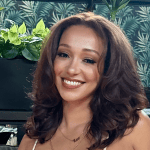 Alexis Coleman graduated from UW–Madison in 2017 with degrees in sociology and social welfare. She received a master’s degree in nursing in 2021 from Case Western Reserve University in Cleveland, Ohio. She is currently pursuing a master’s degree in the Family Nurse Practitioner program at Case Western Reserve University while living and working in the California’s Bay Area as a neonatal ICU nurse.
Alexis Coleman graduated from UW–Madison in 2017 with degrees in sociology and social welfare. She received a master’s degree in nursing in 2021 from Case Western Reserve University in Cleveland, Ohio. She is currently pursuing a master’s degree in the Family Nurse Practitioner program at Case Western Reserve University while living and working in the California’s Bay Area as a neonatal ICU nurse.
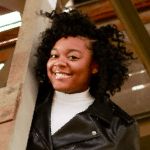 Kennedy Egerson is a current third-year student at UW–Madison pursuing a degree in nursing. She is a Milwaukee native and a co-chair of the 2024 Black History Month Planning Committee.
Kennedy Egerson is a current third-year student at UW–Madison pursuing a degree in nursing. She is a Milwaukee native and a co-chair of the 2024 Black History Month Planning Committee.
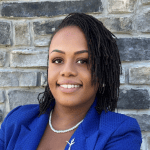 Karla Foster is director of student and recent graduate engagement for the Wisconsin Foundation and Alumni Association. Previously, she was the inaugural program coordinator for the Black Cultural Center and the inaugural assistant director for cultural programming for the Multicultural Student Center. Foster earned a bachelor’s degree in general studies in the arts and humanities and a minor in African American and African diaspora studies from Indiana University Bloomington and a master’s degree in student affairs and higher education from Indiana State University.
Karla Foster is director of student and recent graduate engagement for the Wisconsin Foundation and Alumni Association. Previously, she was the inaugural program coordinator for the Black Cultural Center and the inaugural assistant director for cultural programming for the Multicultural Student Center. Foster earned a bachelor’s degree in general studies in the arts and humanities and a minor in African American and African diaspora studies from Indiana University Bloomington and a master’s degree in student affairs and higher education from Indiana State University.
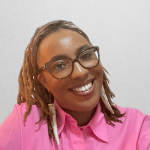 Jordan Gaines is a 2016 alumna with degrees in English and African American studies. She is the inaugural chair of the Black History Month Planning Committee and the re-creator of the Black Voice. Gaines served as an executive board member of the Black Student Union and is a 2013 initiate of the Zeta Xi Core Chapter of Delta Sigma Theta Sorority, Inc. She is a relational therapist and pleasure activist in Brooklyn, New York.
Jordan Gaines is a 2016 alumna with degrees in English and African American studies. She is the inaugural chair of the Black History Month Planning Committee and the re-creator of the Black Voice. Gaines served as an executive board member of the Black Student Union and is a 2013 initiate of the Zeta Xi Core Chapter of Delta Sigma Theta Sorority, Inc. She is a relational therapist and pleasure activist in Brooklyn, New York.
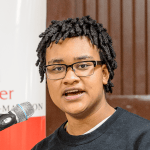 Nia Scott grew up in Tampa, Florida, and attended UW–Madison as a scholar in the eighth cohort of the First Wave Hip Hop and Urban Arts Scholarship Program. She now assists with the program as creative manager for the Office of Multicultural Arts Initiatives (OMAI) within the Division of Diversity, Equity and Educational Achievement (DDEEA). Scott earned a bachelor’s degree in art from UW–Madison in 2019.
Nia Scott grew up in Tampa, Florida, and attended UW–Madison as a scholar in the eighth cohort of the First Wave Hip Hop and Urban Arts Scholarship Program. She now assists with the program as creative manager for the Office of Multicultural Arts Initiatives (OMAI) within the Division of Diversity, Equity and Educational Achievement (DDEEA). Scott earned a bachelor’s degree in art from UW–Madison in 2019.
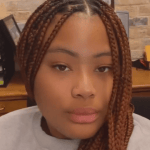 Jada Young is a senior at UW–Madison majoring in education studies with a certificate in African American Studies. She is a co-chair of the 2024 Black History Month Planning Committee, conducts education research, volunteers with two organizations and is a member of the Wisconsin Black Student Union. She serves on the 2023-24 Diversity and Inclusion Student Advisory Board. After graduation this spring, Young plans to pursue a doctorate in education policy or Black studies.
Jada Young is a senior at UW–Madison majoring in education studies with a certificate in African American Studies. She is a co-chair of the 2024 Black History Month Planning Committee, conducts education research, volunteers with two organizations and is a member of the Wisconsin Black Student Union. She serves on the 2023-24 Diversity and Inclusion Student Advisory Board. After graduation this spring, Young plans to pursue a doctorate in education policy or Black studies.
About this project
Student journalists
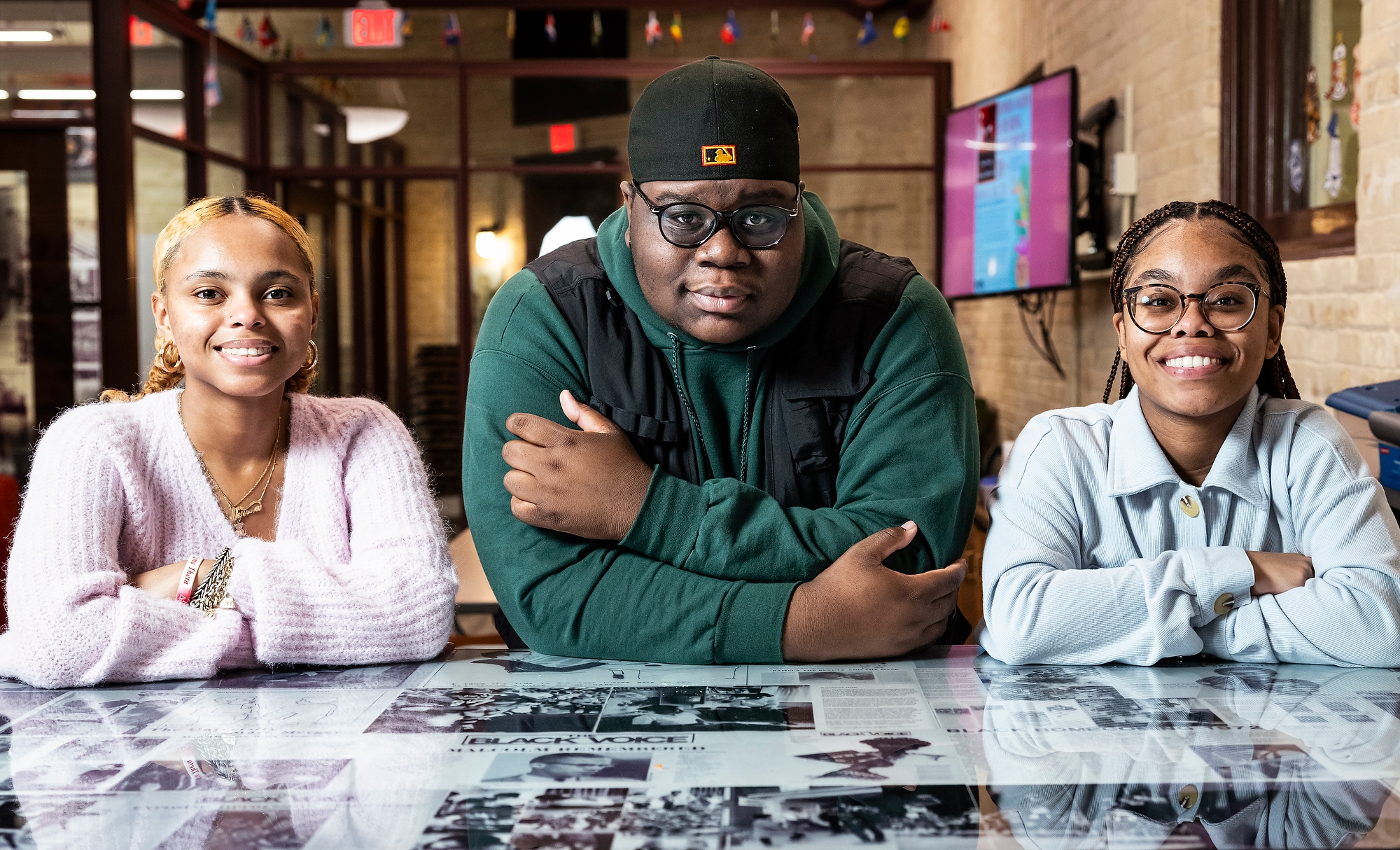
Student journalists Kamyia Denson, James Whitelow and Amara Alexander in the Black Cultural Center Photo: Jeff Miller
Amara Alexander is a third-year journalism major with a focus in strategic communications at UW–Madison. A Posse scholar, she serves as chief of staff and social media coordinator for Queen In You and is a member of the 2024 Black History Month Planning Committee. She is originally from Chicago.
Kamyia Denson is a third-year communication arts student from Washington, D.C. She is progressing toward certificates in entrepreneurship and textile and fashion design. Denson is the program coordinator for the Black Voice and a video intern at University Communications. She is second vice president of the Zeta Xi Chapter of Delta Sigma Theta Sorority, Inc.
James Whitelow is a third-year student in the School of Journalism and Mass Communication, where he is studying reporting and strategic communication. He is originally from Benton Harbor, Michigan, and was raised in Milwaukee. Whitelow is a PEOPLE scholar and has served on the scholarship’s Student Leadership Team since sophomore year. He is a current writing fellow for the program PEOPLE Precollege. Whitelow serves on the student executive board of the Black Voice as copy editor. He has participated on numerous campus panels on various topics, including college readiness, mental health and student engagement.
Our collaborators
This project is a joint effort by the Black History Month Planning Committee, University Communications and the Black Cultural Center, which is part of Student Affairs. Interviews were conducted by student journalists Amara Alexander, Kamyia Denson and James Whitelow and Doug Erickson, a writer with University Communications. The package was edited and designed by Caitlin Henning, an editor with University Communications.
